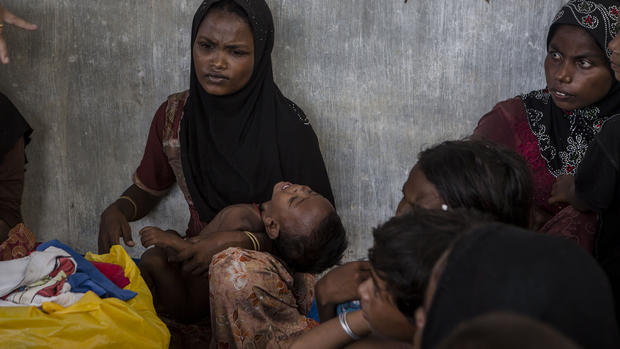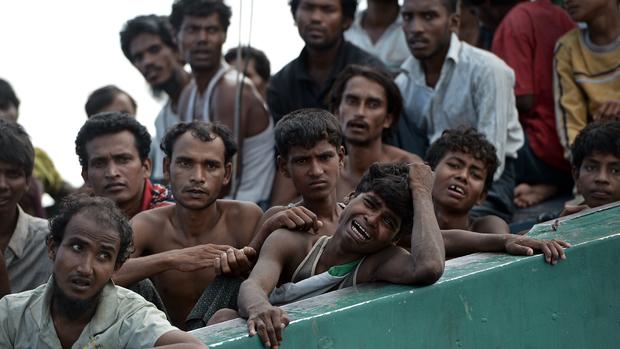Potential lifeline for the "boat people"
PUTRAJAYA, Malaysia -- In a potential breakthrough in Southeast Asia's humanitarian crisis, Indonesia and Malaysia offered Wednesday to provide temporary shelter to thousands of migrants stranded at sea after weeks of saying they weren't welcome.
But they appealed for international help, saying the crisis was a global, not a regional, problem.
"Indonesia and Malaysia agreed to continue to provide humanitarian assistance to those 7,000 irregular migrants at sea," Malaysian Foreign Minister Anifah Aman said after a three-way meeting with counterparts from Indonesia and Thailand. The two countries "also agreed to provide them temporary shelter provided that the resettlement and repatriation process will be done in one year by the international community."
"This is not an ASEAN problem," Anifah said, referring to the 10-nation grouping of Southeast Asian countries. "This is a problem for the international community. We are talking about a humanitarian crisis."
Thailand would not offer shelter but would provide humanitarian assistance, he said. Thailand has previously said it cannot afford to take any more migrants since it is already overburdened by tens of thousands of refugees from Myanmar.
Anifah avoided answering questions on whether the refugees would be accepted even if the international community did not cooperate, but to another question said they would be given shelter "immediately."
While the three ministers were meeting, a flotilla of Indonesian fishermen rescued more than 430 migrants who were stranded at sea for weeks and brought them to safety. More than 3,000 ethnic Rohingya from Myanmar and Bangladeshis have already landed in the three countries in recent weeks, although some boats have been turned away.
Most of the migrants are believed to be victims of human traffickers, who recruit them in Myanmar's Sittwe province and in Bangladesh with promises to give them safe passage to Malaysia, and jobs once they land there.
The migrants were rescued early Wednesday by more than a dozen fishermen's boats, said Herman Sulaiman, from East Aceh district's Search and Rescue Agency.
It was unclear if all those rescued Wednesday were on one boat or had come from several. An initial batch of 102 people were the first brought to shore in the village of Simpang Tiga in Indonesia's eastern Aceh province, Sulaiman and other rescuers said.
"They were suffering from dehydration, they are weak and starving," Khairul Nove, head of Langsa Search and Rescue Agency in Aceh province. Among the 102 passengers were 26 women and 31 children, he said.
One of the migrants, Ubaydul Haque, 30, said the ship's engine had failed and the captain fled, and that they were at sea for four months before Indonesian fishermen found them.
"We ran out of food, we wanted to enter Malaysia but we were not allowed," he said.
One of the fishermen who led the rescue was 40-year-old Razali Puteh. He said he spotted a green wooden trawler crammed with people who were screaming, waving their hands and clothes at him to get his attention.
As he neared the trawler, people aboard began jumping into the water, trying to reach his boat. He said he asked them to stay on their boat, which apparently had no motor, and promised to return with help. He then returned with other fishing boats and brought the migrants to shore.
It was not clear how the three governments reached the figure of 7,000 refugees. The U.N. refugee agency believes there are some 4,000 at sea although some activists had initially put the number at 6,000.
The crisis emerged this month as governments in the region began cracking down on human trafficking. Some captains of trafficking boats abandoned their vessels - and hundreds of migrants - at sea. Prior to the arrival of new migrants Wednesday, about 3,000 had reached land in Malaysia, Thailand and Indonesia, in recent weeks.
Myanmar's cooperation is seen as vital to solving the crisis, but its government has already cast doubt on whether it will attend a conference to be hosted by Thailand on May 29 that is to include 15 Asian nations affected by the emergency.
Myanmar officials have said they will not attend if the word "Rohingya" is mentioned on the invitation or if Myanmar is going to be blamed as "the source of the problem."
The Rohingya Muslims have faced decades of state-sanctioned discrimination in Myanmar, which is predominantly Buddhist. The U.N. says they are one of the most persecuted groups in the world.
In the past three years, Rohingya were targeted by violent mobs of Buddhist extremists, leaving hundreds dead and sparking an exodus of more than 120,000 people, according to the UNHCR. Even the name Rohingya is taboo in Myanmar, which calls them "Bengalis" and insists they are illegal immigrants from Bangladesh, even though Rohingya have lived in the country for generations.

